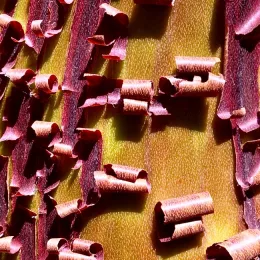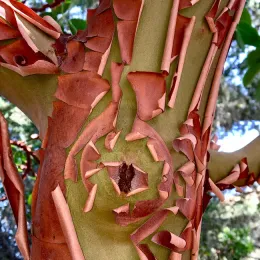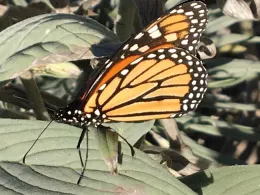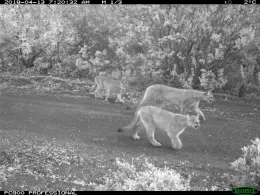

What's going on when manzanitas (Arctostaphylos sp) and Pacificmadrone (Arbutusmenziesii) peel their beautiful smooth red bark into cinnamon-like curls? Trees and shrubs with smooth bark lack a thick woody bark layer, so they need to employ alternative protective strategies. By self-exfoliating a thin layer, they shed insects, moss, lichen, and other organisms. Additionally, the red bark is very tannic and bitter, which most species find unpalatable.
New peer-reviewed research from UC Berkeley and The Greater Good Science Center indicates that the awe we feel in nature can dramatically reduce symptoms of post-traumatic stress disorder. Researchers tracked psychological and physiological changes in war veterans and at-risk teens from underserved communities during white-water rafting trips and undergraduate students that kept a nature journal. Read about it, and links to the original studies here.
Registration is now open for Cuesta College's California Naturalist course. The college is offering the course for the first time this fall, Sept. 21 - Nov. 9, on Fridays from 9am-3pm. Each Friday starts on campus with a classroom presentation, followed by a field trip. It's ideal for adults who want to strengthen their knowledge and understanding of California's natural history in a structured 8-week program. It's a great resume-builder for people seeking jobs in environmental fields. And it's a fun and enjoyable way to see many unique areas in San Luis Obispo County. More details at our course site.

The recent 2017 CEEIN Memorandum of Understanding included UC Agriculture & Natural Resources as a new signatory. More information about CEEIN and its members and partners can be found at http://www.ceein.org.
Congrats to the newest #CalNat graduates from the Sagehen Creek Field Station! This week was jammed packed full of the latest research from UC Berkeley and UC Davis, covering local and Sierra geology, cutting edge forestry practices, creek entomology, conifer practice and a whole lot more. Students pledged to take their newfound knowledge back to their communities and give back through their capstone projects. The cherry on top was helping other experts from iNaturalist.org, Audubon California, and more during the fourth annual Sagehen Bioblitz. In just one morning, #CalNat grads and participants of the blitz collected almost 700 observations, helping to document the field station's biodiversity. Highlights of the observations included a new juniper species and horsetail species (Equisetum hymenale) for the basin. Even with scientists collecting data at Sagehen for 68 years, there's always something new to find - keep exploring, naturalists!
Sea star wasting disease, a marine pandemic that wiped out many West Coast sea stars, provided researchers at UC Merced? with a natural experiment in evolutionary survival. They found considerable changes to the sea star genomes following the pandemic by comparing the genomes of those alive just before the pandemic with survivors. Read about it here.



